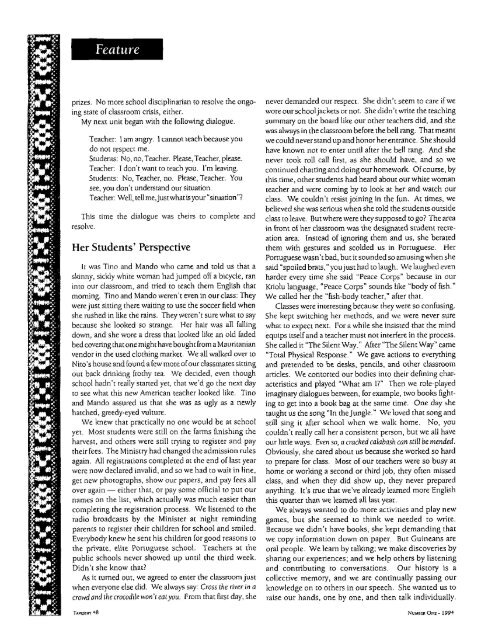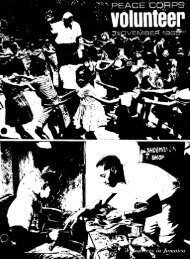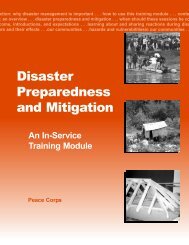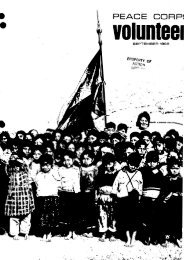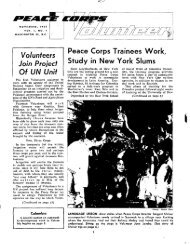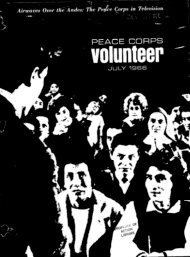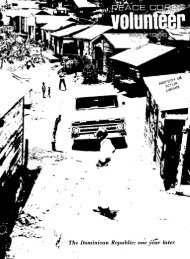The Journey of Azzedine Downes - Peace Corps Online
The Journey of Azzedine Downes - Peace Corps Online
The Journey of Azzedine Downes - Peace Corps Online
You also want an ePaper? Increase the reach of your titles
YUMPU automatically turns print PDFs into web optimized ePapers that Google loves.
prizes. No more school disciplinarian to resolve the ongo-<br />
ing state <strong>of</strong> classroom crisis, either.<br />
My next unit began with the Iollowing dialogue.<br />
Teacher: I am angry. 1 cannot teach because you<br />
do not respect me.<br />
Students: No, no,Teacher. Please,Teacher, please.<br />
Teacher: I don't want to teach you. I'm leaving.<br />
Srudents: No, Teacher, no. Please, Teacher. You<br />
see, you don't undentand our situation.<br />
Teacher: Well, tell me,justwhar is your "situation"?<br />
This time the dialogue was theirs to complete and<br />
resolve.<br />
Her Students' Perspective<br />
It was Tino and Mando who came and told us that a<br />
skmny, sickly white woman had jumped <strong>of</strong>f a bicycle, ran<br />
into our classroom, and uied to teach them English that<br />
morning. Tino and Mando weren't even in our class: <strong>The</strong>y<br />
were just sitting there waiting to use the soccer field when<br />
she rushed in like the rains. <strong>The</strong>y weren't sure what to say<br />
because she looked so strange. Her hair was all falling<br />
down, and she wore a dress that looked like an old faded<br />
bed covering that one might have boughtfrom a Mauritanian<br />
vendor in the used clothing market. We all walked over to<br />
Nito's house and found a few more <strong>of</strong>our classmates sitting<br />
out back drinking frothy tea. We decided, even though<br />
school hadn't really started yet, that we'd go the next day<br />
to see what this new American teacher looked like. Tino<br />
and Mando assured us that she was as ugly as a newly<br />
hatched, greedy-eyed vulture.<br />
We knew that practically no one would be at school<br />
yet. Most students were still on the farms finishing the<br />
harvest, and others were still trylng to register and pay<br />
their fees. <strong>The</strong>Ministry hadchanged theadmission rules<br />
again. All registrations completed at the end <strong>of</strong> last year<br />
were now declared invalid, and so we had to wait in line.<br />
get new photographs, show our papers, and pay fees all<br />
over again -either that, or pay some <strong>of</strong>ficial to put our<br />
names on the list, which actually was much easier than<br />
completing the registration process. We listened to the<br />
radio broadcasts by the Minister at night reminding<br />
parents to register their children for school and smiled.<br />
Everybody knew he sent his children for good reasons to<br />
the private, elite Porruguese school. Teachers at the<br />
public schools never showed up until the third week.<br />
Didn't she know that?<br />
As it turned out, we agreed to enter the classroom just<br />
when everyone else did. We always say: Cross the river in a<br />
crowdand thecrocodile won't eatyou. From that first day, she<br />
TAP~(TRV 48<br />
never demanded our respect. She didn't seem to care if we<br />
wore our schooljackets or not. She didn't write the teaching<br />
summary on the board like our other teachers did, and she<br />
wasalways in the classroom before the bell rang. That meant<br />
wecould neverstandupand honorherentrance. Sheshould<br />
have known not to enter until after the bell rang. And she<br />
never took roll call first, as she should have, and so we<br />
continued chattingand doing our homework. Ofcourse, by<br />
this time, other students had heard about our white woman<br />
teacher and were coming by to look at her and watch our<br />
class. We couldn't resist joining in the fun. At times, we<br />
believed she was serious when she told the students outside<br />
class to leave. Butwhere were they supposed togo? T e area<br />
in front <strong>of</strong> her classroom was the designated student recreation<br />
area. Instead <strong>of</strong> ignoring them and us, she berated<br />
them with gestures and scolded us in Portuguese. Her<br />
Portuguese wasn't bad, but it sounded so amusingwhenshe<br />
said "spoiled brats," youjust had to laugh. We laughed even<br />
harder every time she said "<strong>Peace</strong> <strong>Corps</strong>" because in our<br />
Kriolu language, "<strong>Peace</strong> <strong>Corps</strong>" sounds like "body <strong>of</strong> ftsh."<br />
We called her the "fish-body teacher," after that.<br />
Classes were interesting because they were so confusing.<br />
She kept switching her methods, and we were never sure<br />
what to expect next. For a while she insisted that the mind<br />
equips itselfand a teacher must not interfere in the process.<br />
She called it "<strong>The</strong> Silent Way." After "<strong>The</strong> Silent Way" came<br />
"Total Physical Response." We gave actions to everything<br />
atid pretended to be desks, pencils, and other classroom<br />
articles. We contorted our bodies into their defining characteriitics<br />
and played "What am I?" <strong>The</strong>n we role-played<br />
imaginary dialogues between, for example, two books fighting<br />
to get into a book bag at the same time. One day she<br />
taught us the song "In the Jungle." We loved that song and<br />
still sing it after school when we walk home. No, you<br />
couldn't really call her a consistent person, but we all have<br />
our little ways. Evm so, a cracked calabash can still be mended.<br />
Obviously, she cared about us because she worked so hard<br />
to prepare for class. Most <strong>of</strong> our teachers were so busy at<br />
home or working a second or third job, they <strong>of</strong>ten missed<br />
class, and when they did show up, they never prepared<br />
anything. It's true that we've already learned more English<br />
chis quarter than we Learned all last year.<br />
We always wanted to do more activities and play new<br />
games, but she seemed to think we needed to write.<br />
Because we didn't have books, she kept demanding that<br />
we copy information down on paper. But Guineans are<br />
oral people. We learn by talking; we make discoveries by<br />
sharing our experiences; and we help others by listening<br />
and contributing to conversations. Our history is a<br />
collective memory, and we are continually passing our<br />
knowledge on to others in our speech. She wanted us to<br />
raise our hands, one by one, and then talk individually.<br />
NUMBER OPE - 1994


